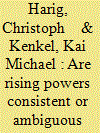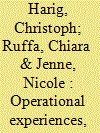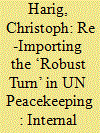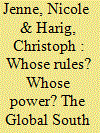|
|
|
Sort Order |
|
|
|
Items / Page
|
|
|
|
|
|
|
| Srl | Item |
| 1 |
ID:
153860


|
|
|
|
|
| Summary/Abstract |
This article illustrates how Brazil responded to the policy challenges its foreign policy activism posed for its engagement with a fundamental question of the international order: the tension between the protection of human rights and the prohibitions on intervention and the use of force. Leading the military component of the UN Stabilization Mission in Haiti (MINUSTAH) implicated accepting the mission's robust mandate that contradicted Brazil's traditional foreign policy positions. Notwithstanding this apparent contradiction, the country's diplomats also tried to shape UN debates on intervention norms, resulting inter alia in the ‘responsibility while protecting’ initiative. By analysing diplomatic efforts and military actions on the ground, we argue that since the watershed moment of becoming the most influential troop contributor to MINUSTAH, interests and actions of the armed forces increasingly contradict the efforts of Brazil's diplomatic establishment. The influence of Brazil's diplomacy in shaping intervention norms has proved to be rather elusive, compared with its military's palpable role in developing robust approaches for peacekeeping mandates revolving around the protection of civilians. Yet we argue that this apparent contradiction should not be seen as inconsistency. Instead, the case of Brazil shows typical signs of the ‘graduation dilemma’, in which both diplomats and military behaved in an eminently rational fashion.
|
|
|
|
|
|
|
|
|
|
|
|
|
|
|
|
| 2 |
ID:
183894


|
|
|
|
|
| Summary/Abstract |
Academic research on civil-military relations often assumes that dangers for democracy and civilian control mainly emanate from the military's predisposition of ‘pushing’ its way into politics. Yet, civilian control frequently is a precondition for governments’ moves of ‘pulling’ the military into roles that may potentially be problematic. These can include the military's involvement in political disputes or internal public security missions. Notwithstanding its empirical relevance, little academic work has been devoted to understanding how ‘pulling’ works. In this article, we aim to provide a first, exploratory framework of ‘pulling’ that captures the dynamics of the military's reactions and indirect consequences for civil-military relations. We identify three analytically distinct phases in which pulling occurs. First, politicians initiate either operational or political pulling moves. Second, we situate the military's reaction on a spectrum that ranges from refusal to non-conditional compliance. This reaction is driven by the military's role conceptions about appropriate missions and their relation to politics. In a third phase, the military may slowly start shifting its role conceptions to adapt to its new roles. We illustrate our argument with case studies of two different instances of pulling: operational pulling in the case of France (2015–19) and operational – then-turned-political – pulling in the case of Brazil (2010–20).
|
|
|
|
|
|
|
|
|
|
|
|
|
|
|
|
| 3 |
ID:
171140


|
|
|
|
|
| Summary/Abstract |
Peace operations of the United Nations (UN) have changed significantly since the 1990s. The turn towards “stabilisation” operations increasingly allows the use of military force against armed groups. For some troop contributing armies, this means that peacekeeping has become the first occasion on which soldiers gain combat experience. Yet, what are the consequences of this development for eventual internal public security roles of armed forces? Contributing to discussions on conditions for organisational change, this article develops a model for blending the analysis of bottom-up adaptation and top-down military innovation with studies on civil-military relations. This model is used for examining military learning that resulted from the reciprocal relationship between the Brazilian military’s internal “Guaranteeing Law and Order” (GLO) operations and coercive operations against urban crime groups during the UN Stabilisation Mission in Haiti (MINUSTAH). The article finds that a complex interplay between bottom-up adaptation and top-down innovation – enabled by politicians who supported the transfer of lessons – led to a process in which internal missions and peacekeeping deployments mutually informed military change. Soldiers’ adaptation to coercive operations, changes in the legal framework for internal missions, and the development of appropriate doctrine for urban operations resulted in the institutionalisation of military learning.
|
|
|
|
|
|
|
|
|
|
|
|
|
|
|
|
| 4 |
ID:
183890


|
|
|
|
|
| Summary/Abstract |
A considerable amount of research within security studies has explored the military's increasingly diverse and multifaceted tasks. However, this debate has been disconnected from the literature on civil-military relations to the effect that we still lack knowledge about how and why these operational tasks have consequences for the relations between the armed forces, civilian authorities, and society at large. In order to provide for a better understanding of these effects, this introduction to the Special Issue debates the concept of operational experiences to capture how the military's routine activities affect the equilibria, logics, and mechanisms of civil-military relations. The article then provides an overview of the Special Issue's six contributions, whose diverse and global perspectives shed light on different aspects of the relationship between military missions and the military's roles in society and politics. Among other factors, they highlight role conceptions – the military's shared views on the purpose of the institution – as crucial in shaping the dynamic relation between what the military does and what place it occupies within the state and society. The article concludes by describing potentially fruitful areas of future research.
|
|
|
|
|
|
|
|
|
|
|
|
|
|
|
|
| 5 |
ID:
170283


|
|
|
|
|
| Summary/Abstract |
Brazil has been the largest troop contributor and provided all force commanders to the UN Stabilisation Mission in Haiti (MINUSTAH, 2004–2017). As the military embraced a leading role in UN peacekeeping’s turn towards peace-enforcement, Brazil’s governments have increasingly relied on soldiers in public security – occasionally even portraying these operations as a sort of ‘peacekeeping at home’. Yet how has Brazil’s participation in MINUSTAH affected internal military operations? I argue that narratives of the military’s effectiveness in Haiti have been used to legitimise the growing scope of internal public security missions. Drawing on data from a questionnaire-based survey, interviews and focus groups with soldiers and officers, this paper argues that the experience in Haiti has fuelled troops’ demands for rules of engagement that resemble those in UN peacekeeping. Given the armed forces’ increasing bargaining power in Brazil’s politics, the military leadership has been able to successfully lobby in favour of changing parts of the legal framework for internal operations. Lessons from the ‘robust turn’ have been used to promote more coercive internal missions of Brazil’s armed forces. Yet it is impossible to fully reconcile the content of the military’s demands with the rule of law in a democracy.
|
|
|
|
|
|
|
|
|
|
|
|
|
|
|
|
| 6 |
ID:
187031


|
|
|
|
|
| Summary/Abstract |
International organisations reflect global power configurations and as such, are deemed to reproduce global inequalities. Nevertheless, they also represent opportunities for the Global South to challenge the global stratification of power, for instance by providing personnel to international agencies and bureaucracies. This article examines the role of leadership personnel from the Global South in implementing robust peacekeeping mandates.
Given that states from the Global South have often been hesitant to support the use of force internationally, can leadership positions in peace operations help these states to influence norms at the implementation level? We develop a conceptual understanding of individuals’ role in implementing norms and apply the framework to military force commanders from Brazil, India, and Rwanda. The analysis demonstrates that appointments provide an opportunity for norm contestation, but do not necessarily guarantee such influence. Under certain circumstances, we find that military force commanders can actually undermine their governments’ preferences. However, the relation between force commanders’ practices and their country of origin's policy stance is complex and influenced by a variety of different factors that merit further investigation.
|
|
|
|
|
|
|
|
|
|
|
|
|
|
|
|
|
|
|
|
|